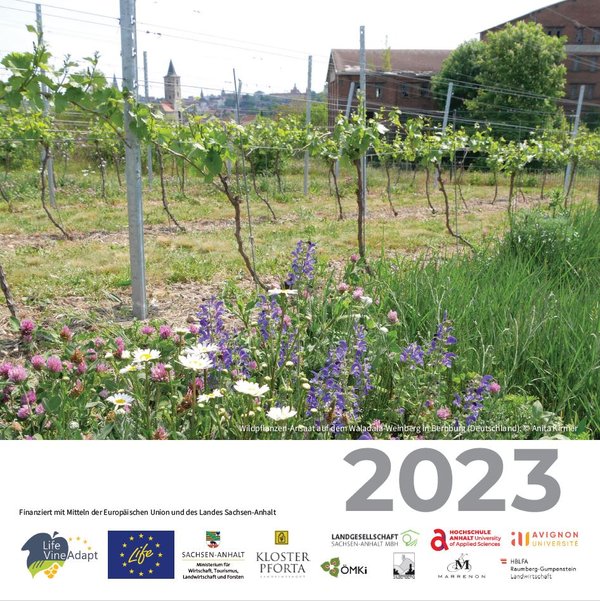Under scrutiny: Mid-term results of the LIFE VineAdapt project presentedtellt
The partners and the steering group of the international project LIFE VineAdapt recently met for a monitoring meeting. The project partners from France, Austria, Hungary and Germany presented their mid-term results. Cornelia Schmitz from NEEMO EEIG - Particip GmbH, a consortium commissioned by the EU to advise on and monitor LIFE projects, was thus able to get a good overview of the project status.
After a lecture part, the guests went to the vineyards. First, the guests visited the Waladala vineyard in Bernburg, an experimental vineyard of the Anhalt University of Applied Sciences. Prof. Dr. Dieter Orzessek, retired rector of the Anhalt University of Applied Sciences, manages it voluntarily. Another stop was a vineyard of the Born winery near Höhnstedt close to the Süßen See lake. Elisabeth and Jochen Born have been participating in the LIFE VineAdapt project since 2021. As part of the project, the vineyard alleys in the participating vineyards were greened. Cichorium intybus, Papaver dubium, Centaurea jacea and others create a colourful picture between the vines in summer. But these plants do not only look beautiful. They attract insects that kill pests and pollinate other plants. Through their roots, the plants strengthen the soil to prevent it from being washed away easily during heavy rain. In addition, a vegetation cover between the vines protects the soil from severe drying out.
First project results now show that biodiversity is significantly higher in vineyards planted with wild plants. The testing of alternatives to chemical-synthetic pesticides showed that mechanical treatment is the most effective and cheapest option. Mulchers are used to push back unwanted plants. Surprising interim results were obtained on the subject of irrigation. In irrigated vineyards, the cover of flowering plants was lower for the time being, as was the occurrence of some insects that depend on flowering plants. No clear findings have yet been made in the area of alternative fertilisation methods. Further studies with different fertilisers are necessary. The aim is to make vineyards more biologically diverse and fit for climate change.
The overall project will run until June 2025 and is funded by the EU through the LIFE programme. The Ministry of Economics, Tourism, Agriculture and Forestry of Saxony-Anhalt is providing the co-financing for the German partners Anhalt University of Applied Sciences, the State Winery Kloster Pforta and the Landgesellschaft Sachsen-Anhalt mbH.















